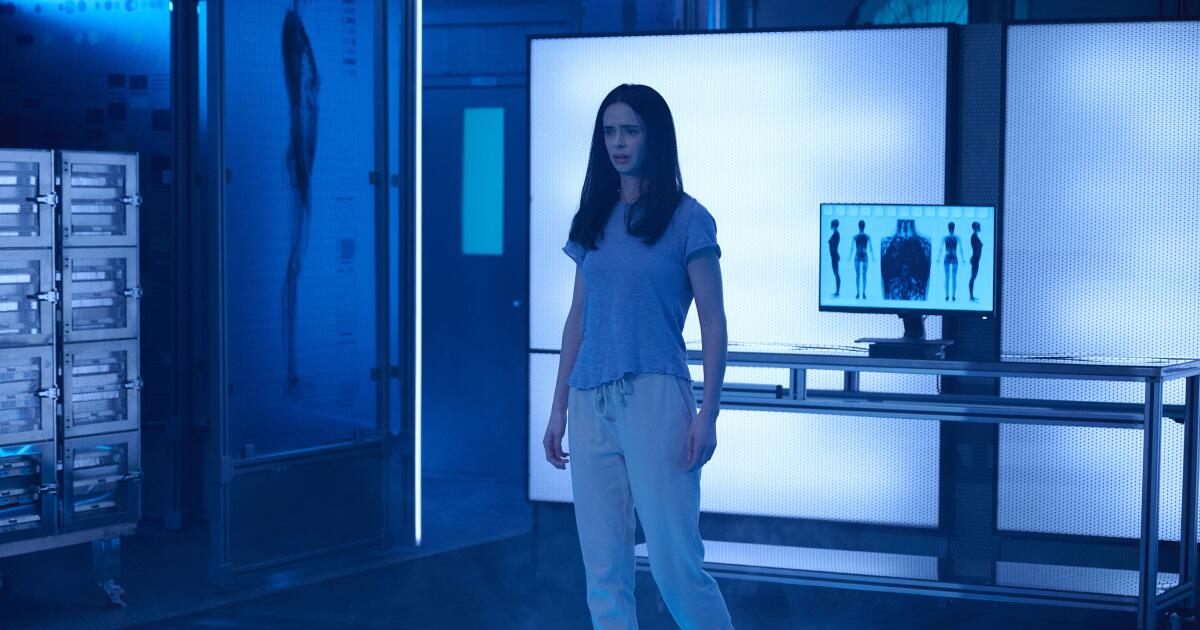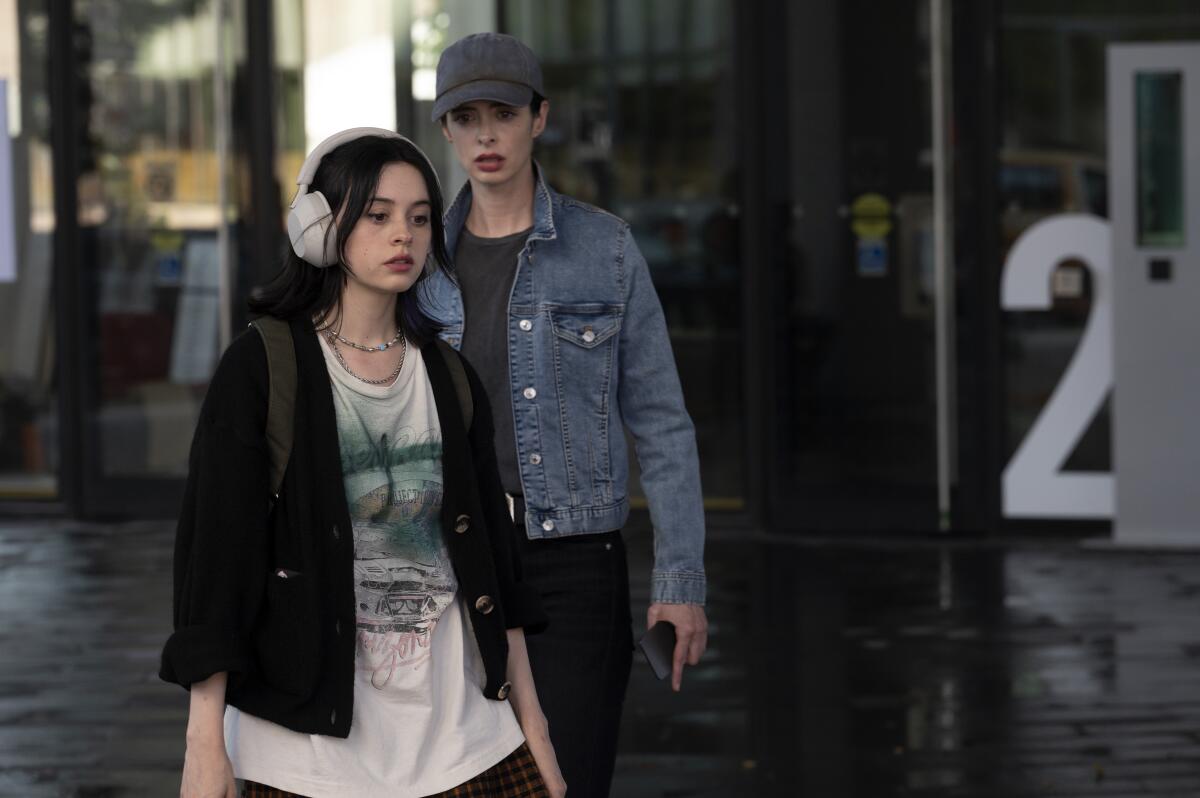Entertainment
'Orphan Black: Echoes' mirrors a television industry desperate to reclaim its glory days

This article contains spoilers for the first episode of “Orphan Black: Echoes.”
Sometimes a new television show illuminates the limitless possibilities of the art form. And sometimes it reveals that art form’s struggles.
“Orphan Black: Echoes” is precisely what the title implies — a far-off reverberation of an original event, in many ways mirroring the state of television at the moment, scrambling to reclaim its former glory.
This is not to damn “Echoes.” If it was not attached to a masterwork, it could be viewed as a perfectly serviceable, mildly futurist contemplation of the perils of life-replicating technology, deeply rooted in “Frankenstein,” and the vast “what have I wrought?” genre of science-regret that rose in its wake.
In the pilot, which aired Sunday on AMC, Lucy (Krysten Ritter) wakes up on a living room sofa. She is immediately, and kindly, questioned by a woman in a white coat (Keeley Hawes) who is very interested in the state of Lucy’s memory. When it becomes clear that Lucy has no memory, of anything at all, things get a bit … agitated.
Soon enough, Lucy has broken out of the living room, only to discover that it is just a set in a warehouse full of all sorts of funky “science” equipment — weird X-rays, slowly turning fans and a box full of pink goo that contains a half-formed human. The scientist appears and gently informs Lucy that she is the result of cutting-edge technology, a flesh and blood “print-out” of human tissue.
The true identity of the scientist (Keeley Hawes) who greets Lucy in “Orphan Black: Echoes” is revealed at the end of the first episode.
(Sophie Giraud / AMC)
Like any good Frankenstein monster, Lucy runs away and somehow creates an off-the-grid life, complete with a lovely boyfriend (Avan Jogia) and his equally lovely deaf daughter (Zariella Langford-Haughton). Not surprisingly, many people are looking for Lucy, and while her perpetually worried creator insists that Lucy is not violent, others are not so sure.
In place of villagers with pitchforks, Lucy does battle with those who want her returned to the lab and/or killed (allowing Ritter to show off her “Jessica Jones” fighting skills). Attempting to find and confront her creator, Lucy sees a younger version of herself — a teenager by the name of Jules (Amanda Fix) — and realizes she is not the only walking-talking printout in existence.
It isn’t until the end of the hour, as she makes a call to her aunt Cosima, that Hawes’ scientist is revealed to be none other than Kira, the child at the center of so much of the drama in “Orphan Black.” To underscore this, the camera sweeps across Kira’s desk, showing photos of Cosima (Tatiana Maslany), her mother Sarah (also Maslany), Felix (Jordan Gavaris) and Mrs. S (Maria Doyle Kennedy).
The shot is, frankly, a big mistake and serves as an instant reminder of how much viewers will miss “Orphan Black.” Despite the fact that both were made by AMC and BBC America, “Echoes” cannot hold a cloned candle to “Orphan Black.” It is not just a different show, it’s a very different type of show, one that takes itself far more seriously than “Orphan Black” ever did.

Jules (Amanda Fix) is a younger version of Lucy (Krysten Ritter).
(Sophie Giraud / AMC)
Although there is delicious irony to be had in the daughter of a clone getting into the human replicating business, the series is not interested in playing with that. In fact, it doesn’t play much at all, remaining, at least in early episodes, unrelievedly serious — even Felix, showing up in a regrettable “look, I’m-older!” wig, hat and glasses, is not allowed to provide the outrageousness and humor that made him such a key player in the original.
Creator Anna Fishko has been clear about her desire to distance “Echoes” from its progenitor, but her methods of doing so strand the narrative in no-man’s land, with Kira’s identity being more of a distraction than a main event, while everyone misses Cosima and all of her clone sestras.
More important is the refusal, by anyone, to mine the absurdity of the situation. Only Jules is allowed to have any fun at all, but even she is confined to angsty teenage anger.
“Orphan Black: Echoes” has Ritter and Hawes, two fine performers, and, as the plot unfolds, an at-times powerful subplot about how far the pain of loss can drive you. But the thing it does best, alas, is remind the world of how truly great and radically under appreciated “Orphan Black” was, and what a mess television has become since it debuted.
In 2013, Maslany dazzled viewers as an ever-expanding group of disparate, and desperate, clones trying to figure out how they came to exist, and who was trying to kill them.
The show arrived at a moment when television had exploded with new platforms and scripted shows that drew obsessively dedicated audiences. AMC was still caught up in the glory of “Mad Men” and “Breaking Bad;” “Orange Is the New Black” and “The Blacklist” had just premiered and “Downton Abbey” and “Game of Thrones” were hitting their strides. Netflix fully entered the game with “House of Cards” while Prime Video test-ballooned “Alpha House.” The problems of “Peak TV” were years away.
Created by Graeme Manson and John Fawcett, “Orphan Black” snuck into the mix as the best sort of sci-fi series. Its reality was not so much re-imagined as slightly tweaked, which allowed the narrative to examine current cultural fault-lines — between science and religion, rich and poor, the individual and the collective — while asking the basic question great art always asks: Who are we really?
The clones became powerful, and often hilarious proof, of how different humans can be while still being essentially the same. Hyper-controlled soccer mom Alison, former street-savvy foster kid Sarah, genius scientist Cosima and whacked-out assassin Helena questioned the morality of extreme science while battling nefarious forces, but they also a hell of a lot of fun to watch.
It was an astonishing feat, by Maslany, of course, but also the writers and the rest of the cast, that impressed most critics (including me) and regular viewers, amassing a devoted fan base dubbed #CloneClub.
But amid the growing cacophony of television’s creative revolution, “Orphan Black” never quite achieved the stature it deserved.
Though Maslany (finally) won an Emmy in 2016, none of the writers, supporting actors or the show itself were similarly acknowledged, which had more to do with the state of the industry than the show itself.
It’s not that “Orphan Black” got lost in the shuffle — its fans were numerous and very vocal. It just never quite occupied the cultural conversation in the way “Mad Men” or “House of Cards” did.
Perhaps it was too sci-fi, or female-centric, or Canadian for its time; perhaps Maslany’s lack of previous stardom made it a tough sell. Whatever the reason, “Orphan Black” remained a mostly word-of-mouth show that should be in the pantheon of work that created television’s modern Golden Age.
Perhaps it will now that “Echoes” is part of television’s Repurposing Age, in which successful series are sold off for parts or recycled entirely.
Television, like Broadway and film, has become more interested in replicating the past than investing in the future, churning out endless sequels, prequels and reboots. As with most things, some of them work — ”Better Call Saul,” Young Sheldon” — some of them don’t — ”Rings of Power,” “And Just Like That” — and some land in between — “House of the Dragon.”
Taken together, however, these regenerative shows reveal an industry attempting to recapture, or cling to, the Golden Age without understanding what made it golden. Television became the ascendant art form of the 21st century because new and re-imaged platforms were willing to swing big, take risks and defy conventional wisdom.
Obviously, the realities of Peak TV, and the welter of streaming services currently competing for eyeballs, create financial pressure that did not exist in those halcyon days. But images grow less vivid the more they are copied and you can’t be groundbreaking if you’re continually mining ground that has already been broken.

Movie Reviews
Jeremy Schuetze’s ‘ANACORETA’ (2022) – Movie Review – PopHorror

PopHorror had the chance to check out Anacoreta (2022) ahead of its streaming release! Does this meta-horror flick provide interesting story telling or is it a confusing mess.
Let’s have a look…
Synopsis
A group of friends heads to a secluded woodland cabin for a weekend getaway, planning to film an experimental horror movie. As the shoot progresses, the project begins to fall apart—until a real and terrifying presence emerges from the darkness.
Anacoreta is directed by Jeremy Schuetze. It was written by Jeremy Schuetze and Matt Visser. The film stars Antonia Thomas (Bagman 2024), Jesse Stanley (Raf 2019), Jeremy Schuetze (Jennifer’s Body 2009), and Matt Visser (A Lot Like Christmas 2021)
My Thoughts
Antonia Thomas delivered an outstanding performance as the female lead in Anacoreta. It was remarkable to watch her convey such a wide range of emotions with authenticity and depth. I was continually impressed by her ability to switch seamlessly between different dialects. I absolutely loved her delivery of the dialogue of telling The Scorpion and the Frog fable.
Anacoreta employs a distinctive, meta-horror style of storytelling. The narrative follows a group of friends creating a “scripted reality” horror film, and as the plot unfolds, the boundary between their staged production and their actual lives becomes increasingly blurred. This was interesting, but at the same time frustrating as a viewer.

Check out Anacoreta on Prime Video and let us know your thoughts!
Entertainment
Todd Meadows, ‘Deadliest Catch’ deckhand, dies at 25

Todd Meadows, a crewmember on one of the fishing vessels featured on the long-running reality series “Deadliest Catch,” has died. He was 25.
Rick Shelford, the captain of the Aleutian Lady, announced in a Monday post on Facebook and Instagram that Meadows died Feb. 25. He called it “the most tragic day in the history of the Aleutian Lady on the Bering Sea.”
“We lost our brother,” Shelford wrote in his lengthy tribute. “Todd was the newest member of our crew, he quickly became family. His love for fishing and his strong work ethic earned everyone’s respect right away. His smile was contagious, and the sound of his laughter coming up the wheelhouse stairs or over the deck hailer is something we will carry with us always.
“He worked hard, loved deeply, and brought joy to those around him,” he added. “Todd will forever be part of this boat, this crew, and this brotherhood. Though we lost him far too soon, his legacy will live on through his children and in every memory we carry of him.”
A fundraiser set up in Meadows’ name described the deckhand from Montesano, Wash., as a father to “three amazing little boys” who died “while doing what he loved — crabbing out on Alaskan waters.”
According to the Associated Press, Meadows died after he was reported to have fallen overboard around 170 miles north of Dutch Harbor, Alaska.
“He was recovered unresponsive by the crew approximately ten minutes later,” Chief Petty Officer Travis Magee, a spokesperson with the Coast Guard’s Arctic District, told the AP. The Coast Guard is investigating the incident.
Meadows was a first-year cast member of “Deadliest Catch,” the Discovery Channel reality series that follows crab fishermen navigating the perilous winds and waves of the Bering Sea during the Alaskan king crab and snow crab fishing seasons. The show debuted in 2005. No episodes from Meadows’ season has aired.
Deadline reported that the show was in production on its 22nd season when the incident occurred, with the Shelford-led Aleutian Lady being the last of the vessels still out at sea at the time. Production has subsequently concluded, per the outlet.
“We are deeply saddened by the tragic passing of Todd Meadows,” a Discovery Channel spokesperson said in a statement that has been widely circulated. “This is a devastating loss, and our hearts are with his loved ones, his crewmates, and the entire fishing community during this incredibly difficult time.”
Meadows is the latest among “Deadliest Catch” cast members who have died. Previous deaths include Phil Harris, a captain of one of the ships featured on the show, who died after suffering a stroke while filming the show’s sixth season in 2010. Todd Kochutin, a crew member of the Patricia Lee, died in 2021 from injuries he sustained while aboard the fishing vessel, according to an obituary. Other cast members have died from substance abuse or natural causes.
Movie Reviews
‘Hoppers’ review: Pixar’s best original movie in years

“So it’s like Avatar?” one character quips in Disney and Pixar’s “Hoppers,” bluntly translating the film’s high-concept premise for the sugar-fueled kids in the audience. And yes, the comparison is apt. The story follows a nature-obsessed teenage girl who manages to quite literally “hop” her consciousness into the body of a robotic beaver in order to spark an animal rebellion against a greedy mayor determined to bulldoze their forest for a freeway.
It’s a clever hook. The kind of big, elastic idea Pixar used to make look effortless. “Hoppers” does not reach the rarified air of “Up,” “Wall-E,” or “Inside Out,” but after a stretch of uneven originals like “Turning Red” and “Luca,” and outright misfires such as “Elemental” and “Elio,” this feels like a genuine course correction. The environmental messaging is clear without being preachy, the animals are irresistibly anthropomorphized, and the studio’s once-signature emotional sincerity is back in sturdy form.
Pixar can afford to gamble on originals when it has a guaranteed cash cow like this summer’s “Toy Story 5” waiting in the wings, but “Hoppers” earns its place in the catalogue. Director Daniel Chong crafts a warm, heartfelt film that occasionally strains under the weight of its own ambition, yet remains grounded by character and theme. Its meditation on conservation and animal displacement feels timely in a way that never tips into after-school-special territory.
We meet Mabel, voiced with bright conviction by Piper Curda, as a child liberating her classroom pets and returning them to the wild. Her moral compass is shaped by her grandmother, voiced by Karen Huie, who imparts wisdom about nature’s sanctity. True to both Pixar tradition and the broader Disney playbook, this beacon of guidance does not survive past the opening act. Loss, after all, is Pixar’s favorite inciting incident.
Years later, Mabel is still fighting the good fight, squaring off against the smarmy Mayor Jerry, voiced with slick menace by Jon Hamm. He plans to flatten the glade where Mabel and her grandmother once found solace. Mabel’s resistance feels noble but futile. The animals have already mysteriously vanished, the machinery is coming, and her last-ditch plan involves luring a beaver back to the abandoned forest in hopes of jumpstarting the ecosystem.
That’s when the film gleefully pivots into mad-scientist territory. At Beaverton University, Mabel discovers her professor, voiced by Kathy Najimy, has developed a device that can project human consciousness into synthetic animals. The process, dubbed “hopping,” allows Mabel to inhabit a robotic beaver and infiltrate the forest from within. It’s an inspired escalation that keeps the film buoyant even when the plotting grows predictable.
Her new posse includes King George, a lovably beaver voiced by Bobby Moynihan with distinct Bing Bong energy; a sharp-tongued bear voiced by Melissa Villaseñor; a regal bird king voiced by the late Isiah Whitlock Jr.; and a fish queen voiced by Ego Nwodim. As is often the case with Pixar, even in its lesser efforts, the world-building is meticulous. The animal hierarchy, complete with titles like “paw of the king,” is layered with jokes that play for kids while slyly winking at adults.
The plot ultimately follows a familiar template. Scrappy underdog rallies community. Corporate villain twirls metaphorical mustache. Emotional third-act sacrifice looms. At times, you can feel the machinery working a little too cleanly. Pixar, and Disney at large, has grown increasingly reliant on sequels and established IP, and “Hoppers” does not radically reinvent the wheel. In an animated landscape where films like “K-Pop: Demon Hunters,” “Across the Spider-Verse,” and “Goat” are pushing stylistic and narrative boundaries, being safe and sturdy may not always be enough.
And yet, there is something refreshing about a Pixar original that remembers how to tug at the heart without squeezing it dry. “Hoppers” is playful, peppered with cheeky needle drops, and builds to a sweet emotional catharsis that may or may not have left this critic a little misty-eyed. It feels earnest and engaged.
“Hoppers” may not be top-tier Pixar. But it is a welcome return to form, a reminder that the studio still knows how to marry big ideas with a bigger heart.
HOPPERS opens in theaters Friday, March 6th.
-

 World6 days ago
World6 days agoExclusive: DeepSeek withholds latest AI model from US chipmakers including Nvidia, sources say
-

 Massachusetts7 days ago
Massachusetts7 days agoMother and daughter injured in Taunton house explosion
-

 Denver, CO7 days ago
Denver, CO7 days ago10 acres charred, 5 injured in Thornton grass fire, evacuation orders lifted
-

 Louisiana1 week ago
Louisiana1 week agoWildfire near Gum Swamp Road in Livingston Parish now under control; more than 200 acres burned
-

 Oregon5 days ago
Oregon5 days ago2026 OSAA Oregon Wrestling State Championship Results And Brackets – FloWrestling
-

 Florida3 days ago
Florida3 days agoFlorida man rescued after being stuck in shoulder-deep mud for days
-

 Maryland3 days ago
Maryland3 days agoAM showers Sunday in Maryland
-

 Culture1 week ago
Culture1 week agoTry This Quiz on Thrilling Books That Became Popular Movies




















